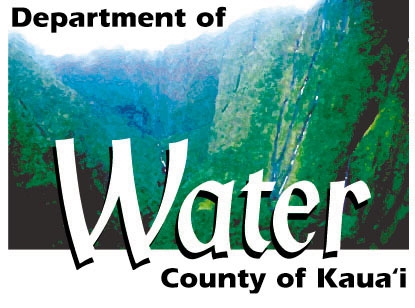By Staff Reports
(LIHUE) – The Department of Water (DOW) reminds residents of water emergency preparedness guidelines for the storing of drinking water, essential water uses and other water emergency tips during a severe weather emergency.
In the event that high winds and/or flooding disrupts the power supply to water sources, residents should have at least one gallon of water stored, per person, per day for at least fourteen days for drinking and sanitation purposes, as part of their emergency preparedness kit.
How to store water
To store water properly, you should:
• Use clean containers, preferably those designed for water storage. Do not use containers that stored questionable materials or food with strong odors (mayonnaise, pickles, etc.) as the water will pick up the odor during storage.
• Disinfect containers. Wash containers thoroughly, then rinse it in a mild bleach solution (one capful of liquid bleach to one gallon of water), and then rinse thoroughly.
• Fill container with water from the tap. Fill the container to the top, keeping a minimal amount of air between the water and the cap. Store it in a cool, dark place.
• Optional – Boiling or bleach disinfection. If you prefer, you can boil water before storing it. You should boil the water at a rolling boil for 1 to 3 minutes, let it cool down until it is slightly warm, fill the containers, and then seal and store immediately. Liquid bleach may also be used to disinfect water that has not been boiled. Add 1 to 8 drops of new, unscented liquid bleach with strength of 5% to 6% (like Clorox) per gallon of water. Seal and store immediately. For questions about boiling or bleach disinfection, please call DOW’s Water Quality Division at 245-5446.
What to do in a storm
Severe weather conditions can affect DOW’s water facilities. If this occurs, the following should be implemented:
• Stay tuned to news reports.
• During an electrical power outage keep water use to an absolute minimum. If electrical service has been disrupted, the outage will also affect DOW’s pumps and equipment. In the event of a power outage, the DOW may shut off valves and isolate tanks to reduce risk of damage and water loss. If this occurs, water will be restored as soon as it is safe for personnel to go out and make the repairs.
• Immediately begin water conservation measures. Use water sparingly. Water should be used for essential uses such as: cooking, drinking and sanitation. Keep toilet flushing to a minimum.
o Collect rain water to utilize for non-potable water needs. Do not drink rain water.
o Turn off or disconnect any devices or fixtures that regularly draw water. Such devices include automatic icemakers and irrigation systems.
What to do After the Storm
• Stay tuned to news reports. The DOW will update the public on the status of the water system, including any warranted drinking water quality advisories through the media and BlackBoard Connect CTY.
• Continue water conservation measures. After the storm has passed, DOW will need to conduct assessment of its water facilities. Water conservation is needed in order to avoid a water outage, in case there are damages to our system. The DOW will send out a notice to the public when the water conservation request has been lifted.
Residents are also advised to sign up for the County’s BlackBoard Connect CTY notification service to be notified on updates regarding weather emergency notices and its effects on Kauai’s water supply services. To sign up for BlackBoard Connect CTY, please visit the county’s

